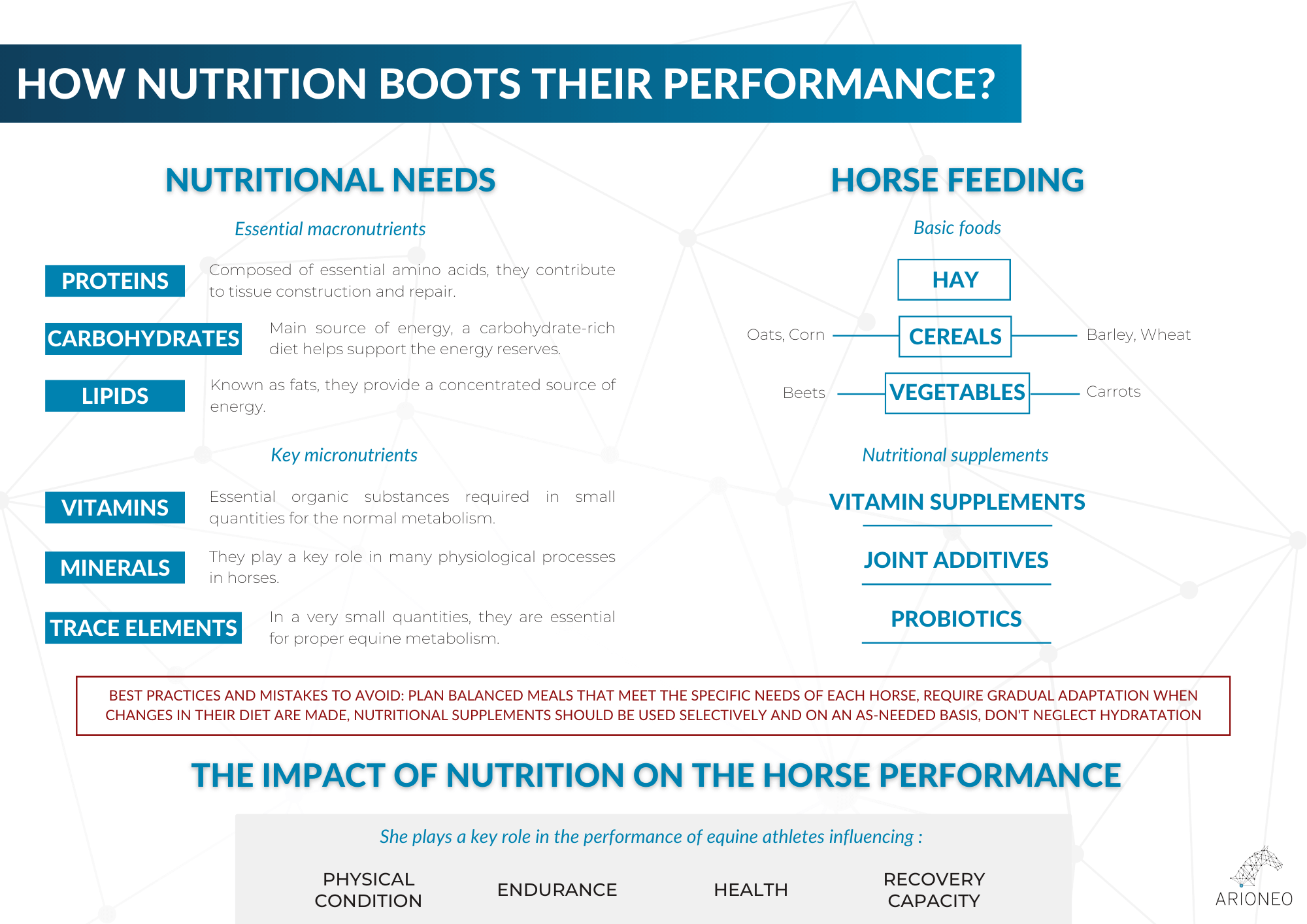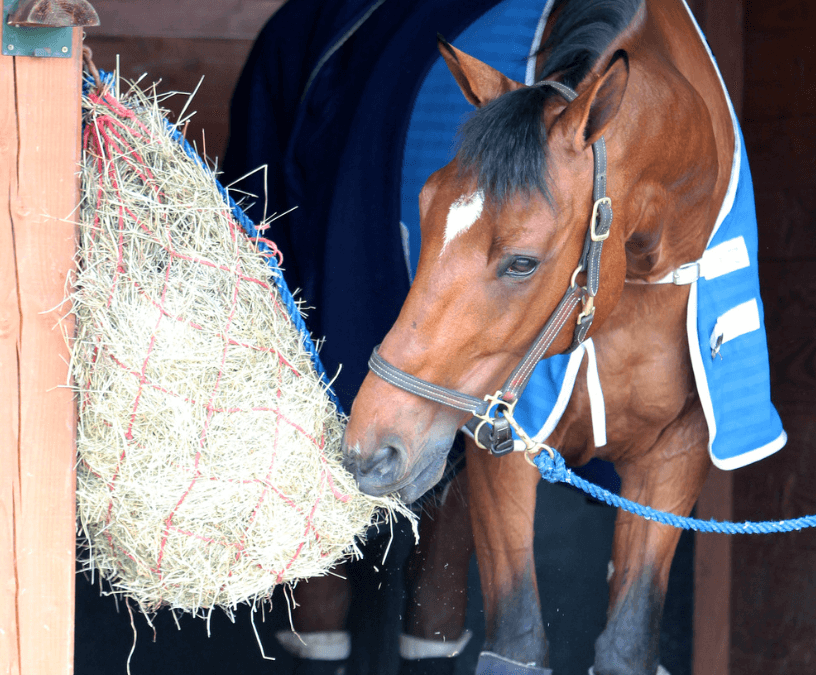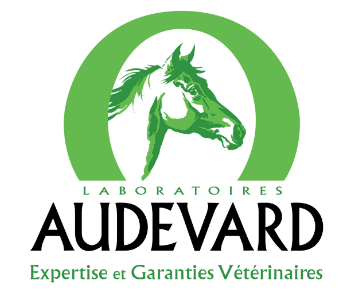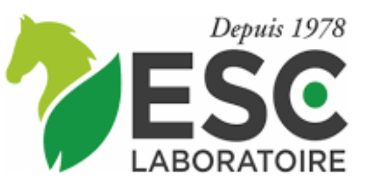Horse supplements are products designed to provide additional nutrients to supplement their basic diet. They are used to meet specific needs, improve the health, well-being and performance of horses. However, they should not be used as a substitute for a balanced and appropriate diet.
What is a dietary supplement? Why give it and what are the best practices to know in their use?
In theory: what is a dietary supplement?
A dietary supplement can be defined as a concentrate of nutrients, plants or other substances, having a nutritional or physiological effect. We can also talk about nutritional supplement. They complete the basic feeding of horses and are intended to meet the specific needs of each.
Available in powder, granules, liquid or tablets, they can contain many elements: vitamins, minerals, amino acids, essential fatty acids, probiotics, prebiotics, herbs, or plant extracts.
In which cases to give dietary supplements?
-
- Supplement nutritional deficiencies: horses may not receive all the essential nutrients they need in their basic diet, especially if their diet is of poor quality or unsuitable for their specific needs.
- Support joint health: supplements containing ingredients such as glucosamine, chondroitin and MSM can help prevent joint problems, maintain mobility and reduce joint discomfort, especially in athletic or older horses.
- Improve hair and skin health: some supplements contain omega-3 fatty acids, which promote healthy skin.
- Strengthen hooves: supplements containing biotin and other essential nutrients can help improve hoof quality and growth.
- Support digestion: probiotics, prebiotics or digestive enzymes help maintain the balance of the intestinal flora, improve digestion and prevent gastrointestinal disorders.
- Promote recovery after exercise: by providing essential nutrients and reducing the risk of muscle aches or fatigue.
- Manage stress and anxiety: some supplements can have soothing properties to calm anxious or stressed horses.
Focus on the nutritional needs of sport horses
Sport horses have many nutritional needs:
- Micronutrients such as proteins, fats and carbohydrates participate in the construction and repair of tissues, provide energy and play an important role in maintaining body temperature, protection of organs and absorption of fat-soluble vitamins.
- Micronutrients such as vitamins, minerals and trace elements act as structural constituents, activators of biological reactions, regulators of cellular exchanges. These contain macro-elements – Ca (calcium), P (phosphorus), Mg (magnesium), Na (sodium), Cl (chlorine), K (potassium) – as well as essential trace elements but in smaller quantities – Fe (iron), Cu copper), Zn (zinc), Mn (manganese), Co (cobalt), Se (selenium), I (iodine).
To learn more about the influence of nutrition on sports performance, we recommend this article.
Several varieties of vitamins can be distinguished:
-
- Vitamins A for growth, fertility, vision, skeletal building, after calving.
- Vitamins D for ossification, calcium fixation (bone mineralization)
- Vitamins E for antioxidant side, foal growth, muscle work, body protection. It intervenes in the energy mechanisms
- Vitamins K for blood clotting
- Vitamins B are a growth factor.
- Vitamins C for the stimulating action of muscle metabolism.
In practice: why give nutritional supplements to the athlete horse?
What are the different types of dietary supplements?
-
- Vitamins and minerals: these supplements are designed to fill nutritional gaps in the horse’s diet. They can contain a range of vitamins (Vitamins A, D, E, K, B-complexes, etc) and minerals (Calcium, phosphorus, magnesium, zinc,…).
- Chondroitin, glucosamine, hyaluronic acid: to support joint and cartilage health.
- Probiotics and prebiotics: health of the digestive system of the horse. They promote a balanced intestinal flora.
- Fatty acids: to maintain healthy skin and a shiny coat.
- Amino acids: to improve muscle recovery and performance.
- Chamomile or tryptophan: to help calm anxious or stressed horses.
- Vitamin C: Vitamin C, zinc, echinacea, are ingredients that can help support the horse’s immune system.
What are the different brands of food supplements?
Audevard is a brand with 30 years’ experience in food supplements and care products for horses. The brand offers a range of products, including :
-
- Exercise and recovery with, for example, Bonutron sport pro for balance and performance in sport horses or Redplex booster for vigour and performance on the day of exercise.
- Locomotion with Capsiblist (heating gel) or Ekyflex Osteo for bone support, for example.
- The digestive system with Ekygard flash for occasional gastric support or Ekymash Booster for digestive comfort.
- The respiratory system with Balsamic Air for respiratory comfort (all seasons) or Immuno RS for high-risk seasons.
- Muscles and feet with Ekylaxyl, an arnica-based gel, or Myostem Protec for muscle strength.
- Feeding with Bonutron performance for the balance and performance of endurance horses or Bonutron stud G1-L6 for the balance of gestation and lactation.
For over 50 years, TWYDIL has specialised in the production and sale of supplementary feeds and products for external use, mainly for top-level competition horses and breeding. The company offers a wide range of products, including
- TWYDIL ARTRIDAY is specialised for racehorses and is a daily supplement to improve suppleness and fluidity during exercise.
- TWYDIL Electrolytes is a daily supplement to keep your horse fresh and reactive during exercise.
- TWYDIL PMC is a dietary supplement for a strong musculoskeletal system.
ESC Laboratoire has specialised in phytotherapy for horses for over 40 years. The brand offers a very wide range of care products and natural feed supplements for horses to relieve a number of ailments. For example, electrolytes with Electrosea or Equicomplément for form and vitality.
There are many other brands, such as Balios Pharma – which specialises in animal dermatology – Farnam, which brings together the FedVet and Horse Master brands, and Greenpex – which specialises in care products and food supplements. NAF equin, Alliance Equine, Ravene, Rekor, Reverdy, Phyto Master, Unika and Vetoquinol are other brands specialising in a wide variety of areas.
Food supplements: good practices to be aware of
Appropriate nutritional intake
First of all, it is important to check that the horse is receiving the right nutritional intake for its activity and physique before considering taking feed supplements.
What’s more, it’s essential to choose quality feed supplements. To achieve this, it’s best to choose products manufactured by companies that are recognised and respected in the equine nutrition sector.
Careful reading of labels – which indicate recommended dosages – is essential to avoid any risk of over- or under-dosing, which could be harmful to your pet’s health.
Incorporating food supplements into the diet
Incorporating a feed supplement gradually into your horse’s diet will help to avoid any undesirable reactions or digestive discomfort. It’s best to start with small quantities and then, if the horse doesn’t show any signs of discomfort, gradually increase the dose until the recommended amount is reached. This approach will allow the horse’s digestive system to adapt smoothly to the extra nutrients.
In addition, it is important to monitor consumption and observe the horse’s behaviour carefully to ensure that it is consuming the supplements. Some horses can be fussy and reject their food if supplements are added.
The impact of feed supplements on the performance of sport horses
The needs of athletic horses are very high, as the exertion to which they are subjected requires their bodies to work at full capacity. They lose minerals through sweat, and using their muscles burns up a lot of calories. It is therefore important to analyse the horse’s precise needs, based on its physique and sporting destination. A trotter does not use his body in the same way as an endurance Arabian horse, which means that his needs are not the same. For example :
- For jumping horses, the daily hay ration is approximately 5 kg per horse. Cso events are intense, but also very fast. The horse must be given energy quickly, and mineral and vitamin supplements are provided by balanced feed. For this type of event, it is advisable to supplement the horse’s diet with minerals and trace elements.
- For endurance horses, to avoid colic or other digestive problems, it is preferable to limit forage intake to a maximum of 3 to 5 kg per day. Vitamins are essential for fatty acid metabolism. Vitamins such as A, D, K and E help to balance the digestive and metabolic systems. Because of the significant losses through sweat, endurance horses may require electrolytes containing sodium, potassium, chlorine, calcium and magnesium.
- For racehorses and eventers, who are mainly fed on raw materials such as oats and/or barley and hay that is particularly rich in protein, food supplements such as vitamins, trace elements or phytotherapy can be useful in helping to optimise the horse’s performance.

Conclusion
There is a wide variety of feed supplements and brands, all specialising in specific supplements or needs. A feed supplement is not something to be taken lightly, so reading the leaflets and following the instructions meticulously will ensure that your horse’s needs are met. Properly administered feed supplements can help optimise performance.
SOURCES :
Pascal, A. (2021). Quels compléments alimentaires pour chevaux choisir ? [online] Casalys Nutrition. Available at: https://www.casalys-nutrition.fr/complements-alimentaires-chevaux/ [Accessed 7 Aug. 2023].
www.reverdy.fr. (n.d.). Compléments alimentaires pour cheval – Reverdy. [online] Available at: https://www.reverdy.fr/fr/e-boutique/supplements-nutritionnels#:~:text=Qu [Accessed 7 Aug. 2023].
Ifce.fr. (2023). Available at: https://equipedia.ifce.fr/elevage-et-entretien/alimentation/nutrition-et-ration/mineraux-et-vitamines [Accessed 7 Aug. 2023].
Classequine. (n.d.). Audevard. [online] Available at: https://www.classequine.com/boutique/205-audevard [Accessed 7 Aug. 2023].
grandprix.info. (n.d.). Mieux comprendre l’intérêt des compléments alimentaires. [online] Available at: https://grandprix.info/fr/52438/Mieux-comprendre-linteret-des-complements-alimentaires/ [Accessed 7 Aug. 2023].
Rocky (2023). Intégration réussie des compléments alimentaires dans l’alimentation de votre cheval : astuces et conseils. [online] Astuces Jardins. Available at: https://astuces-jardins.com/integration-reussie-des-complements-alimentaires-dans-lalimentation-de-votre-cheval-astuces-et-conseils/ [Accessed 7 Aug. 2023]
Royal Horse. (n.d.). L’alimentation du cheval de compétition. [online] Available at: https://www.royal-horse.com/fr/dossier/cheval-alimentation-competition/ [Accessed 7 Aug. 2023].
Key words: food supplements, deficiencies, digestion, joint health, vitamins, performance, etc.
Photo credit: @scoopdyga




